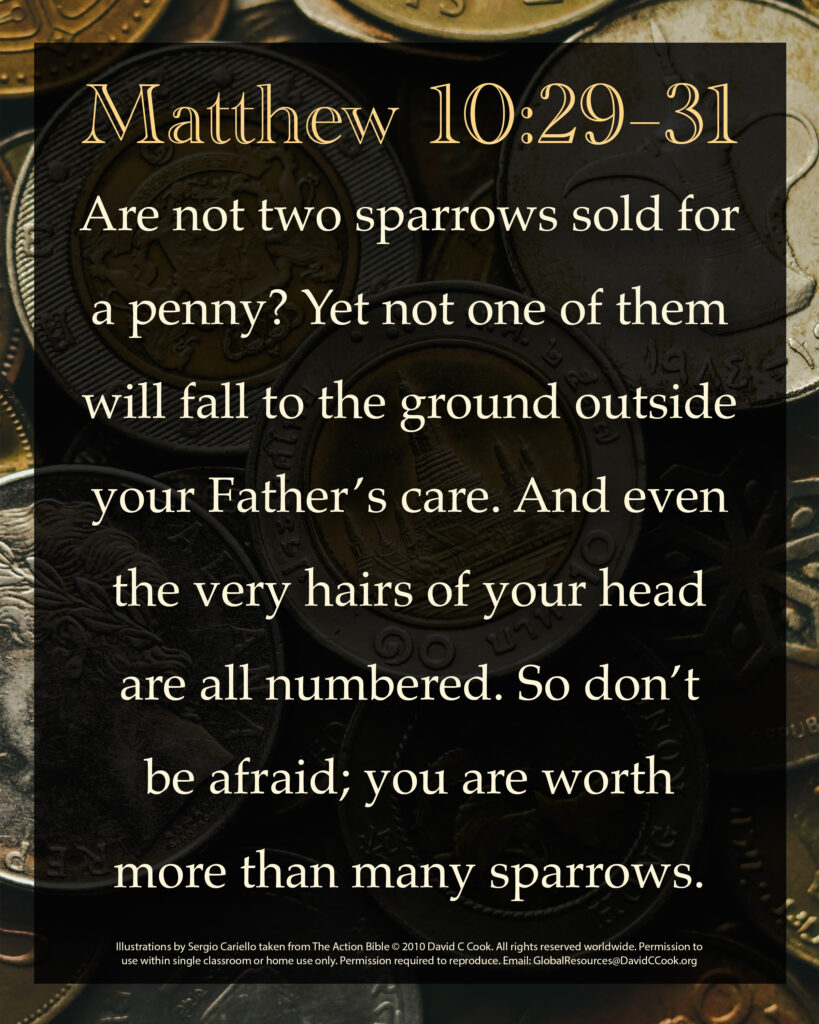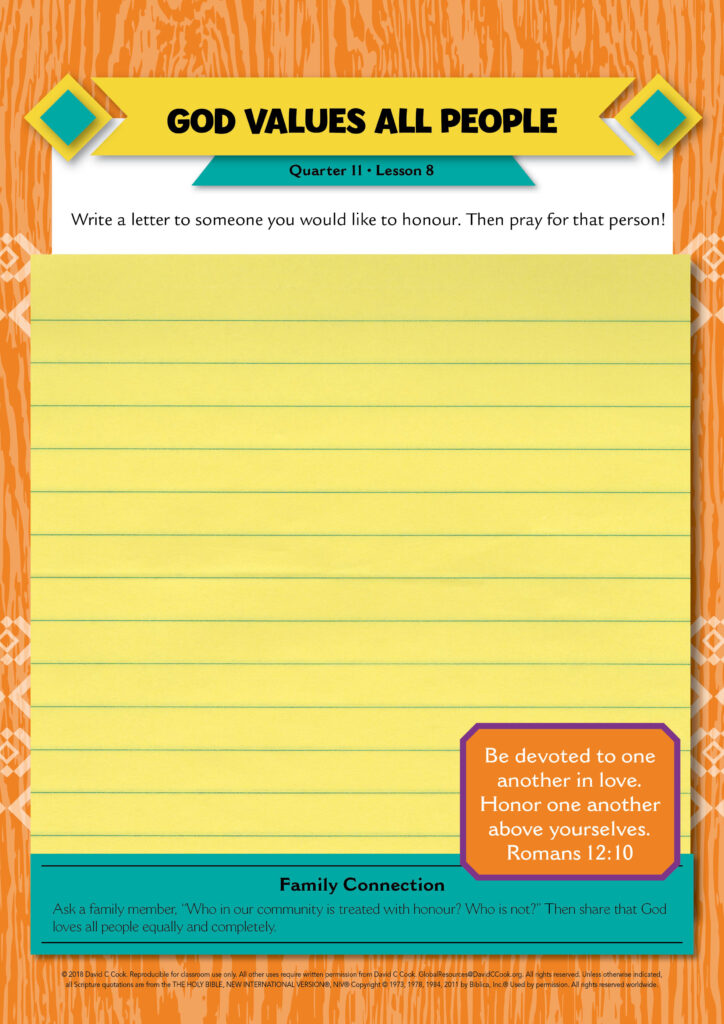During the lesson, the information for you to know is written in regular type, and what we suggest speaking or reading aloud to children is in bold. All resources for this lesson, including the Teacher Guide, Student Page, Family Connection Card, and other resources can be downloaded in a ZIP file by clicking on the following link:
In some lessons you will find "resource articles." These are articles written by experts from around the world to help equip you for your work with children and adolescents. Share them with parents or guardians if you consider it appropriate.
Before class, clear an area at least 4–5 meters long for the Connecting activity. If necessary, move furniture before class to make a space, or do the activity outside.
Also, tear out the page at the end of this lesson with the descriptions of Bible people to use during the Teaching section.
All the people saw this and began to mutter, “He has gone to be the guest of a sinner.”
Luke 19:7
Zacchaeus was a hated man. As a Jewish tax collector, others in his community considered him a traitor and a cheater. So when Jesus visited Zacchaeus’ house, He turned the human idea of honour upside down. Jesus chose to honour Zacchaeus even when no one else did. This type of honour may seem confusing or wrong. After all, honour should only be given to those who deserve it. But this is not God’s way. We are all sinners, just like Zacchaeus. God chose to honour us when we did not deserve it, just as He chooses to honour every other person He created.
Think of someone in your life you have considered unworthy of honour. Then turn those ideas about honour upside down. Instead of thinking of that person as less worthy of honour, think of her as worthy of more honour. How can you show her more honour? Ask God to turn your heart upside down and make it more like His.
Encourage the students to ask their family members, “Who in our community is treated with honour? Who is not?” They can then share that God loves all people equally and completely.
Teacher Tip: If possible, email or text the Family Connection Card to the families of your students.
Greet students as they arrive. Invite them to share their experiences interacting with disabled people since the last lesson. Then ask them to think about who the most important people in their lives are and why. Allow them to share with you and with others in the class.
When you are ready to begin class, have the students stand in the cleared area of your teaching space. The area should be at least 4–5 meters long.
I will say the name of a group, type of person, or occupation in our community. Think about how highly these people are honoured in our community on a scale of 1–10.
Point to 1 end of the cleared space.
This end represents 1, which means not honoured at all. If you think the group is not honoured by the community, you will stand at that end.
Point to the other end of the clear space.
This end represents 10, which means highly honoured. If you think the group is highly honoured in our community, you will stand at that end.
If you think the group is honoured somewhere between 1 and 10, stand at the place you think represents that group. For example, if you think the group is honoured in average ways, you may stand in the middle of the line to represent a 5.
Use the list below or think of your own. After you say a person or group, give the students time to move to the place on the line they think represents the amount of honour that group of people usually receives. Ask 1–2 students to share with the class why they chose the place they did. Repeat these steps 4–5 times, naming a different group of people each time. Be sure to choose groups that represent different ages, genders, and education levels.
When you are finished, gather the students together. Have them sit in their usual area.
In almost every community around the world, people judge one another based on things such as money, education, social status, and even appearance. People are honoured based on what their jobs are or how much money or power they have.
Humans may judge one another’s importance based on status, ability, and money, but God does not. God made every person in His image. Men and women, young and old, rich and poor, powerful and vulnerable, disabled and able-bodied—all people are of equal and great value to God! He loves each of us completely!
Many of the people we read about in the Bible were not highly honoured by the people in their communities. Yet God chose to love them and use them to accomplish His purposes. Let’s learn about a few of those people.
Divide the class into 3 groups. Have each group sit in a different area around your space. Give each group 1 of the Bible people from the page you tore out from the end of the lesson. Explain that each group has a different person. Their job is to become experts on that person. They will choose someone in their group to read the card out loud. Then their group will discuss the questions together. If possible, give each group a Bible to read more about their person. When the groups are finished discussing their Bible people, they will teach the rest of the class about that person.
Walk around and listen to each group as they learn about and discuss their Bible person. Answer any questions they have and encourage all of the students to participate in the discussion.
For your reference, the descriptions of the people from the Bible are included here.
Moses (Exodus 2—4)
Optional: If you are using The NIV Action Study Bible, the students can look at the illustrations of Moses’ life near Deuteronomy 27.
Samaritan Woman (John 4)
Zacchaeus (Luke 19)
Optional: If you are using The NIV Action Study Bible, the students can look at the illustration of Zacchaeus talking to Jesus near Luke 19.
Give groups about 10 minutes to read about their Bible people and discuss the questions. Then have each group share what they learned with the rest of the class. Group members can take turns reading their cards out loud or telling the class about their Bible people using their own words. Ask groups to read the questions at the bottom of their cards and share their answers.
After all 3 groups have shared, gather the whole class together for discussion.
Moses, the Samaritan woman, and Zacchaeus were not honoured by the people in their communities. Moses was a Hebrew with a speech impediment living in Egypt. The Samaritan woman was from a despised ethnic group. Zacchaeus was very short.
Moses, the Samaritan woman, and Zacchaeus also made choices that affected the way others treated them. Moses killed a man, the Samaritan woman was unfaithful in marriage, and Zacchaeus cheated people out of money.
God loved Moses, the Samaritan woman, and Zacchaeus, just as He loves all of us. We cannot do anything to make Him love us more or less. Listen to what the Bible tells us about how God values us.
Have a student read Matthew 10:29–31 aloud from the Bible. If that is not possible, the passage is printed here for you.
If you are using the Memory Verse Poster, show it to the students.
Are not two sparrows sold for a penny? Yet not one of them will fall to the ground outside your Father’s care. And even the very hairs of your head are all numbered. So don’t be afraid; you are worth more than many sparrows.
Matthew 10:29–31

What does this verse tell us about God?
According to this passage, how does God feel about each person?
God’s love for us is so great that He honours us even though we do not deserve it. The Bible tells us that we are all sinners, and our sin separates us from God. But God made a way for us to be forgiven for our sins. He treated us with honour when we did not deserve it. That is an amazing gift!
All people are created in God’s image, and He loves us all completely. Often we do not treat each other with that kind of honour. But God calls us to honour one another as He does.
Be devoted to one another in love. Honor one another above yourselves.
Romans 12:10
What are some ways we can treat others in our community with honour?
Allow 4–5 teens to share their ideas. Suggestions could include give them a compliment, pray for them, help them with a problem or need, share a meal with them, give them a small, homemade gift, ask them for advice, listen to them, and treat them with kindness and compassion.
Divide the teens into groups of 3–4.
With your group, think of some people in our community who are not usually treated with honour. Do not say their names; just describe why they are not honoured.
Give the teens a few minutes to discuss their thoughts.
Optional: If you are using the Student Pages, the teens can use their pages to write letters to people they would like to show honour to.

It is possible there have been times when you have not been treated with honour. Maybe you have faced challenges or made poor choices as Moses, the Samaritan woman, and Zacchaeus did. You do not need to share these things with your group. Ask God to help you to find your honour in Him. Ask Him to help you treat others as you would want to be treated instead of how you have been treated.
Close with a blessing based on Matthew 10:29–31:
Blessing: May our loving God, who has numbered the hairs on your head, give you opportunities to show others His love by honouring them. May you see yourself as precious and worthy of honour, as God does.
Lead the teens in singing this quarter’s song, if possible.
Life on Life ©2020 David C Cook. Reproducible for home or classroom use only. All other uses require written permission from David C Cook [email protected]. All rights reserved.